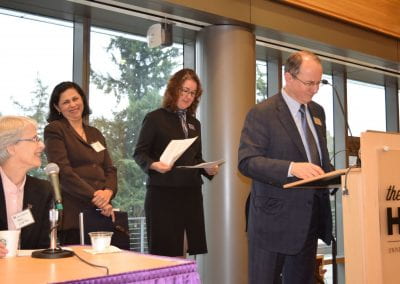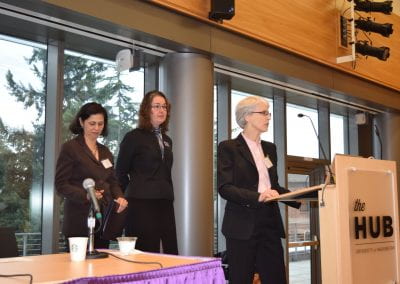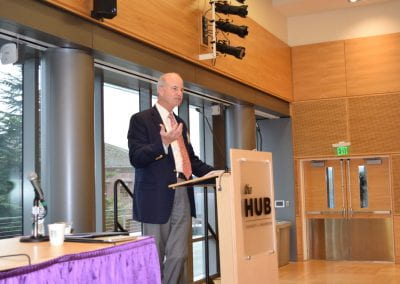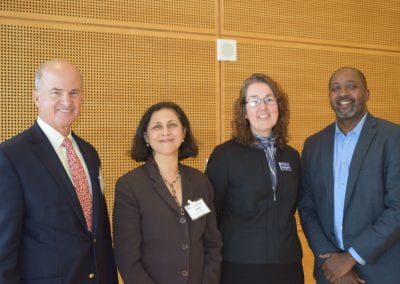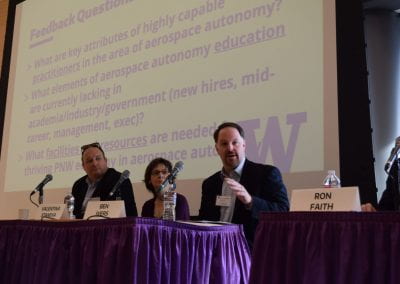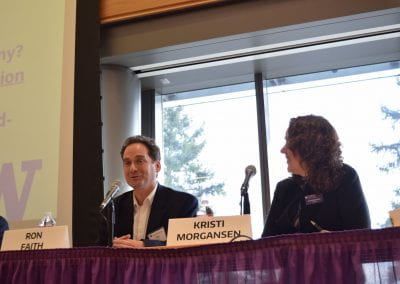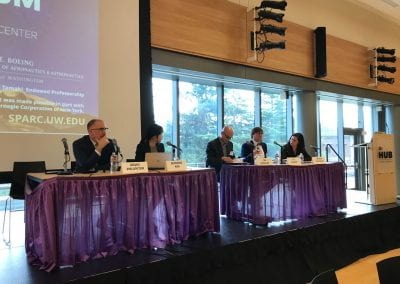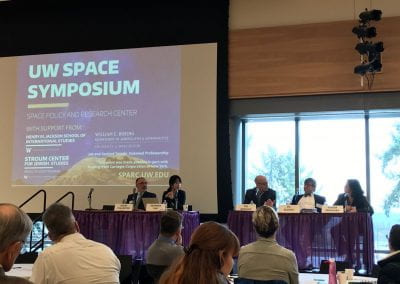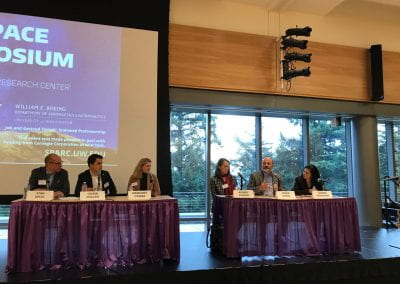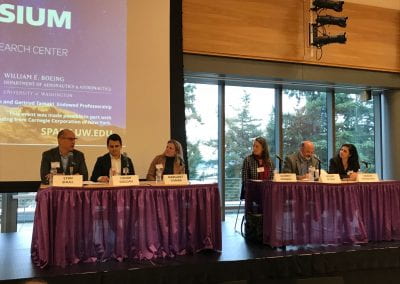2019 SYMPOSIUM PROGRAM
UNIVERSITY OF WASHINGTON HUB SOUTH BALLROOM
Featuring General Kevin Chilton
8:30am
Doors Open with Coffee
9:00am
Welcome and Opening Remarks
Saadia Pekkanen, SPARC Co-Director for Law & Policy
Saadia M. Pekkanen works on outer space security, law, and policy. Her regional expertise is in the international relations of Japan/Asia. She earned Master’s degrees from Columbia University and Yale Law School, and a doctorate from Harvard University in political science. She holds the Job and Gertrud Tamaki Professorship at the University of Washington. She has published a half-dozen books on space technology and geopolitics, and is working now on The Age of Newspace. She serves as Co-Chair of the U.S. Japan Space Forum, and directs both the Space Security Initiative (SSI) and the project on Emerging Frontiers in Newspace. She is a contributor for Forbes on the space industry.
Kristi Morgansen, SPARC Co-Director for STEM
Professor Morgansen’s research interests focus on nonlinear systems where sensing and actuation are integrated, stability in switched systems with delay, and incorporation of operational constraints such as communication delays in control of multi-vehicle systems. Applications include both traditional autonomous vehicle systems such as fixed-wing aircraft and underwater gliders as well as novel systems such as bio-inspired underwater propulsion, bio-inspired agile flight, human decision making, and neural engineering. The results of this work have been demonstrated in estimation and path planning in unmanned aerial vehicles with limited sensing, vorticity sensing and sensor placement on fixed wing aircraft, landing maneuvers in fruit flies, joint optimization of control and sensing in dynamical systems, and deconfliction and obstacle avoidance in autonomous systems and in biological systems including fish, insects, birds, and bats.
Nancy Allbritton, Frank & Julie Jungers Dean of Engineering
Allbritton is an international expert on multiplexed single-cell assays, microfabricated platforms for high-content cytometry combined with cell sorting, and microengineered stem-cell-based systems for recapitulating human organ-level function. Four companies have been formed based on her research discoveries: Protein Simple (acquired by Bio-Techne in 2014), Intellego, Cell Microsystems, and Altis Biosystems. Allbritton holds an appointment in the UW’s Department of Bioengineering. She has been nationally recognized for her research and is a Fellow of the American Association for the Advancement of Science, the American Institute for Medical & Biological Engineering and the National Academy of Inventors.
Prior to joining the UW, Allbritton led the Joint Department of Biomedical Engineering at the University of North Carolina at Chapel Hill and North Carolina State University which spans two universities and three colleges.
Robert Stacey, Dean of Arts and Sciences
9:15am
Opening Keynote with General Kevin Chilton (Ret.)
What do we mean by space security in geopolitics today?
General Kevin Chilton (Ret.)
10:15am
Coffee Break
10:30am
Panel 1: Autonomy and Security in Space
Moderated by Kristi Morgansen, SPARC Co-Director for STEM
Ron Faith, President and COO, RBC Signals
Ben Ivers, Systems Senior Leader, Product Strategy & Future Airplane Development, Boeing Commercial Airplanes
Additionally, Ben serves on the STEM Advisory Board for UW Bothell helping bring an industry perspective to the STEM school.
Ben has a Bachelors in Science in Electrical Engineering from California State Polytechnic University, Pomona and an MBA from the University of Washington.
Valentina Staneva, Senior Data Scientist, UW eScience Institute
Scott Newbern, CTO, AeroVironment
Scott Newbern has served as the Vice President and Chief Technology Officer of AeroVironment since December of 2018. This includes leadership of the MacCready Works Laboratory – a focal point for AeroVironment’s continuous innovation, focusing on relentless problem solving and doing what has never been done before. Scott previously served as the Vice President of small Unmanned Aircraft Systems beginning in 2012. He guided the strategic and tactical activities for the SUAS business area. Scott has served in various UAS leadership positions at AeroVironment since joining the company in 1997. Scott led advanced UAS development activities including establishing high volume SUAS manufacturing capability at AeroVironment.
Scott earned a Bachelor of Science degree in Aerospace Engineering from North Carolina State University and a Master of Science degree in Aerospace Engineering from North Carolina State University with specialty in UAS aerodynamic modeling, control system design and flight research. Scott also completed Stanford Executive Institute program for high technology executives and Gap International’s Executive Challenge.
11:30am
Student Lightning Pitches

- Jesse Brisbois, Political Science: “Indigenizing the space industry: Indigenous perspectives on space development.”
- Charlie Kelly, Aeronautics & Astronautics: “Revolutionizing deep space exploration with plasma aerocapture.”
- James Penna and Finn van Donkelaar, Aeronautics & Astronautics: “The Wave Motion Cannon: Making space development cheaper using supersonic jet launch.”
- Devan Tormey, Aeronautics & Astronautics: “A&A CubeSat Team’s SOC-i.”
12:00pm
Lunch
1:00pm
Panel 2: Regional Policies on Space Security
Moderated by Saadia Pekkanen, SPARC Co-Director for Law & Policy
UAE: P.J. Blount, Postdoctoral Researcher, University of Luxembourg; Adjunct Professor, University of Mississippi and Montclair State University
Dr. P.J. Blount is an adjunct professor in the LL.M in the Air and Space Law at the University of Mississippi School of Law and a Visiting Scholar at the Beijing Institute of Technology School of Law for the Fall of 2017. He also teaches in the Department of Political Science and Law at Montclair State University. He is the former Research Counsel for the National Center for Remote Sensing, Air, and Space Law at the University of Mississippi School of Law. His teaching includes courses such Space Security Law, International Telecommunications Law, Cyberlaw, International Law, Human Rights Law, Intellectual Property, and US Foreign Policy.
Blount’s primary research areas are legal issues related to space security and cyberspace governance. He has published and presented widely on the topic of space security law and has given expert testimony on space traffic management before the U.S. House of Representatives Subcommittee on Space. Blount serves as the co-editor-in-chief of the Proceedings of the IISL; as the editor-in-chief of the Journal of Space Law; and as an editorial board member of the Journal of Astrosociology.
Additionally, he serves on the Board of Directors of the International Institute of Space Law and as the Chair of the Legal Aspects Technical Committee of the American Institute for Aeronautics and Astronautics. He is a member of the State Bar of Georgia.
Israel: Tal Azoulay, Space Policy Researcher, Tel Aviv University
Tal Azoulay is a space policy researcher specializing in the fields of international cooperation and conflict resolution. He has lectured on these topics at various academic institutions in Israel, as well as publishing contributions to the recent Handbook of Space Security Policy. He has been a researcher at the Yuval Neeman Workshop for Science, Technology and Security at Tel Aviv University.
Mr. Azoulay served for almost 10 years in Office of the Prime Minister of the State of Israel, focusing on promoting international cooperation in a variety of defense and technology-related fields.
Mr. Azoulay attained his BA in Political Science from Stony Brook University in New York, and his MA in Security Studies from Tel Aviv University in Israel.
Russia: Seonhee Kim, Postdoctoral Fellow, Columbia University
Seonhee Kim is interested in the politics of authoritarian and hybrid regimes in the region of Russia, Central Asia, and Eastern Europe, covering the topics of electoral authoritarianism, state repression, human rights, social movements, space security, and the welfare state. Her work broadly speaks to the field of comparative politics and political economy.
As a junior fellow of SSI (Space Security Initiative) at the University of Washington, she published a brief on the status of space programs in Russia and co-authored another article on South Korea. The article on the Russian space industry tracks down the reform processes and their social, political, and economic ramifications since the collapse of the Soviet Union. It is presented as part of the SSI-Brief series funded by the Carnegie Corporation of New York. She examines the space program in Russia in the context of the authoritarian survival at large, being subject to the battle between different economic-political interests of competing elites.
Her doctoral research focuses on judicial measures used to repress civil society at large in Russia since the Bolotnaya protest in 2012. The dissertation project investigates how the use of officially established procedures for the state’s coercion in the pursuit of regime legitimacy results in an unexpectedly moderate level of repression in Russia.
She received her B.A. from Incheon University and M.A. from Seoul National University, South Korea. She is expected to defend her doctoral thesis in December, 2019 at the Jackson School of International Studies, the University of Washington. She recently accepted a postdoctoral fellowship position at the Harriman Institute, Columbia University, starting from January, 2020.
China: Kevin Pollpeter, Senior Research Scientist, CNA China Studies Division
A Chinese linguist, Pollpeter holds an M.A. in international policy studies from the Monterey Institute of International Studies and is currently enrolled in a Ph.D. program at King’s College London.
2:00pm
Coffee Break
2:15pm
Panel 3: Bridging Academia, Industry and Government
Moderated by Saadia Pekkanen, SPARC Co-Director for Law & Policy
Margaret O'Mara, Howard and Frances Keller Endowed Professor, UW History Department
Her research focuses on the high-tech industry, American politics, and the connections between the two. Her newest book is a history of the technology industry from the 1940s to the present, titled The Code: Silicon Valley and the Remaking of America (Penguin Press, 2019).
Audrey Powers, Deputy General Counsel, Blue Origin
Audrey received a Bachelor’s degree in Aeronautical and Astronautical engineering from Purdue University and worked as an engineer for almost 10 years prior to becoming a lawyer. As a guidance and controls engineer, she was a flight controller for NASA with 2000 hours of console time in Mission Control for the International Space Station Program, where she supported numerous space shuttle assembly flights, led technical meetings with the Russian Space Agency, and directed recovery of the ISS attitude control system during two on-orbit emergencies. Audrey also supported government satellite programs for Lockheed Martin.
Audrey received a Juris Doctor in 2008 from Santa Clara University School of Law, and is admitted to the California, Washington, and DC bars. As Blue Origin’s Deputy General Counsel, Audrey handles a wide variety of legal matters, but focuses primarily on progressing the legal framework that governs commercial and civil space activities. Audrey is committed to reducing regulatory burdens on space vehicle operators, thus promoting emerging technologies while ensuring safe operability of those vehicles. Audrey has appeared on numerous conference panels and testified before the House Transportation and Infrastructure Committee, Aviation Subcommittee on the topic of reform of space vehicle launch & reentry licensing regulations.
Audrey’s other responsibilities at Blue Origin include high value supplier negotiations, land use and construction matters, launch vehicle licensing, maritime law, and insurance and risk management.
Stan Shull, Founder, Alliance Velocity
Roger Myers, Chair, Washington State Joint Center for Aerospace Technology
Dr. Myers earned his PhD from the Department of Mechanical and Aerospace Engineering at Princeton University and a Bachelor of Science in Aerospace Engineering, summa cum laude, from the University of Michigan. He and his wife, Trudi, live in Woodinville, Washington.
Conor Duggan, Business Development Manager for Aerospace, Washington State Dept of Commerce
Conor works on aerospace issues at the Washington State Department of Commerce. The agency’s Office of Economic Development and Competitiveness is primarily tasked with helping to strengthen and grow Washington’s major industrial sectors, and Conor is particularly focused on enabling emerging aerospace subsectors such as space, drones, and electric aviation. Prior to joining the state government, he worked in the commercial space industry doing business development work in Cape Canaveral and advocating for a commercial return to the Moon in Washington, DC. Conor received a bachelor’s degree in Political Science from Santa Clara University, where he became passionate about the role of science and technology policy in fostering global peace, progress, and prosperity.
3:15pm
Coffee Break
3:30pm
Mapping the PNW Space Ecosystem: A Strategic Working Session
Led by Kristi Morgansen, SPARC Co-Director for STEM
and Saadia Pekkanen, SPARC Co-Director for Law & Policy
4:00pm
Reception
OUR SPONSORS



Job and Gertrud Tamaki Endowed Professorship

